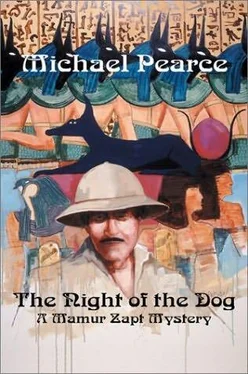Michael Pearce - The Mamur Zapt and the Night of the Dog
Здесь есть возможность читать онлайн «Michael Pearce - The Mamur Zapt and the Night of the Dog» — ознакомительный отрывок электронной книги совершенно бесплатно, а после прочтения отрывка купить полную версию. В некоторых случаях можно слушать аудио, скачать через торрент в формате fb2 и присутствует краткое содержание. Жанр: Исторический детектив, на английском языке. Описание произведения, (предисловие) а так же отзывы посетителей доступны на портале библиотеки ЛибКат.
- Название:The Mamur Zapt and the Night of the Dog
- Автор:
- Жанр:
- Год:неизвестен
- ISBN:нет данных
- Рейтинг книги:3 / 5. Голосов: 1
-
Избранное:Добавить в избранное
- Отзывы:
-
Ваша оценка:
- 60
- 1
- 2
- 3
- 4
- 5
The Mamur Zapt and the Night of the Dog: краткое содержание, описание и аннотация
Предлагаем к чтению аннотацию, описание, краткое содержание или предисловие (зависит от того, что написал сам автор книги «The Mamur Zapt and the Night of the Dog»). Если вы не нашли необходимую информацию о книге — напишите в комментариях, мы постараемся отыскать её.
The Mamur Zapt and the Night of the Dog — читать онлайн ознакомительный отрывок
Ниже представлен текст книги, разбитый по страницам. Система сохранения места последней прочитанной страницы, позволяет с удобством читать онлайн бесплатно книгу «The Mamur Zapt and the Night of the Dog», без необходимости каждый раз заново искать на чём Вы остановились. Поставьте закладку, и сможете в любой момент перейти на страницу, на которой закончили чтение.
Интервал:
Закладка:
“Perhaps.”
“I am not frightened of you.”
“Why should you be,” asked Owen, “when all you will get is justice?”
“Your justice.”
“Egyptian justice.”
“Does a Copt ever get justice,” asked Andrus, “in Egypt?” He turned impatiently towards the door. “Come! Take me!”
“Sit down!”
If he took Andrus now it would be no good. The Copts would merely regroup without him. And Andrus would be untouched, impregnable behind his rigid simplicities. His world was still certain.
“Why do the British hate the Copts?” asked Andrus.
“We do not hate the Copts. We are neutral between Copts and Moslems.”
“How can a Christian be a Christian and be neutral?”
“We are all servants of the Khedive,” said Owen, correct in form if not in substance, “British as well as Copt, Copt as well as Moslem.”
“I do not understand,” said Andrus, “how a Christian can voluntarily choose to serve a Moslem.”
“Many do,” Owen pointed out, “including many Copts.”
For some reason this seemed to irritate Andrus particularly.
“They are traitors!” he said passionately. “They are traitors to the Coptic cause.”
“To try to provide good government to the people of Egypt is hardly to be a traitor.”
“The people of Egypt! Who are the people of Egypt? We are. The Copts. And for two thousand years we have had a government not our own. And why is that? Because we Copts have let others govern us. We have even helped them to govern. We have worked with the Government when we should have been working against it. For two thousand years we have done that. And for two thousand years every government has been that of an invader.”
Where had he heard that before?
“You are a Moslem,” Andrus said to Mahmoud, “and you are an invader. You are invaders too,” he said to Owen, “but you are Christian. When the British came we thought that they would lift the Moslem yoke from off our backs. But Christian turned against Christian. They supported the Moslems instead of sweeping them away.”
The moment of doubt, if there had been one, had gone. Andrus was back in his old self-confident stride. He would go to prison, if he had to go to prison, convinced of his rightness, proud of his martyrdom.
It was time to move in.
“Andrus,” said Owen, “you surprise me. You hate the Moslems. Why then do you support them?”
Andrus stopped.
“Support them?”
“Yes. Against your own people, too.”
“I don’t know what you mean,” Andrus declared flatly.
“Sheikh Osman. You give him money.”
“Nonsense!”
“All the money that Sheikh Osman has used in the past few weeks in his war against the Copts is money that you have given him.”
“Nonsense!” said Andrus. “I have given him no money. How would I give him money? You invent these things to trick me.”
“Every week,” said Owen, “every Friday, you take money to Mordecai.”
“Well,” said Andrus, “what of it?”
“Which he gives to Osman.”
“That is just a lie,” said Andrus. “Why do you bother with such tricks?”
“I will bring Mordecai to you if you wish, and he will confirm what I say.”
“You have told him what to say.”
“I will show you the evidence that Osman goes to him every Friday and comes away with the money you have given him.”
“But-but this cannot be.”
“All the money that has been used against the Copts has been supplied by you. And you talk of traitors!”
“Mordecai is the traitor. How dare he do this thing?”
“He does only what he has been told.”
“The money was brought for another purpose.”
“What purpose, Andrus?”
Andrus was silent.
“You brought the money, Andrus, and gave it to Mordecai to be used against the Copts. Against your own people. Why did you do that, Andrus?”
“I did not bring it for that purpose,” said Andrus hoarsely. “Mordecai has tricked me.”
“Not Mordecai. It is not Mordecai who has tricked you. Mordecai has only carried out instructions. Whose instructions were they, Andrus? If they were not yours, whose were they?” Andrus would not reply.
CHAPTER 12
The Mamur Zapt sat in his office, thinking. Nikos started to come into the room, stopped and withdrew unobserved. No one after that was allowed past the office. The bearers sensed the situation and stayed quietly in their office at the other end of the corridor. They were in any case somewhat subdued by Yussuf’s misfortunes. A sympathetic peace descended on the corridor.
In fact, Owen was thinking mostly about Zeinab. Since their visit to the opera relations between them had been distinctly cool, and Owen was feeling the effects of being deprived. He had decided that it was time to think things through and settle them once and for all, but whenever he started thinking about Zeinab thoughts became memories of touch and smell and look and emotion and he became most unsettled. He had to admit, too, that a certain drama had gone out of his life. He considered himself on the whole a pretty steady person, but the trouble with steadiness was that it could very easily become the humdrum. Zeinab, whatever else she might be, was definitely not humdrum. She had all an Arab’s volatility, added to which was an emphatic unpredictability which was all her own. Too strong-willed and forceful to remain easily in any slot into which a male-oriented Moslem society might force her, regarding marriage, certainly to a Moslem, as the ultimate form of prison, conducting life as a ceaseless battle for Home Rule and Independence, she sometimes found things too much for her and plunged into pits of despair, from which she would spring out again almost immediately with a soar and a vehemence which left Owen dazzled. He loved her both when she was cast down and when she was leaping up, and also in between when she was normal, although as far as Zeinab was concerned normality was a flexible concept. However, “love” was, for Owen, a strong word and one which needed thinking about. Particularly in view of Paul’s remarks and what he had said about Jane Postlethwaite.
Paul’s remarks first. There was no need for him to get married yet. Paul’s views notwithstanding, he was not old. On the other hand, Owen was uncomfortably aware, a lot of men were married. Especially senior men. You could safely disregard Paul’s opinion that marriage was a prerequisite of life at the top, because Owen could think of notable exceptions, Kitchener included. Yet there was no doubt that it helped. You fitted more snugly into society, especially, the tight little society around the Consul-General, if you were married and could take your wife along to dinner parties with you, instead of forever having to be fixed up with a stray aunt or somebody. Owen did not think of himself as ambitious. He had left India for Egypt because he wanted to get out, not up. He loved his work as Mamur Zapt. It was still new to him and he wanted to go on doing it. But there might come a time, there was no denying it, when he might have had enough, and then if he wanted to move it would have to be up. But what to? That opened up whole chains of other thoughts which he put resolutely away. He had enough to think about as it was.
But the thought of possible other careers brought him to Jane Postlethwaite. There was no doubt that she would be an asset. Certainly her uncle would. An influential politician would command patronage, although one didn’t like to think of it like that. Jane’s husband would find ways smoothed for him, things open to him. Paul was acute on such matters. Marrying Jane Postlethwaite would be good for his career.
But what about Jane herself? She had a mind of her own and what she wanted would in the end decide what was done. She might well reject him out of hand. It would be a very sensible thing to do and Jane Postlethwaite was a sensible girl. On the other hand, now he thought about it-that was one of the advantages of taking time out to think things through- there had been occasions when she had looked at him in a special way which made him think that she might not reject him.
Читать дальшеИнтервал:
Закладка:
Похожие книги на «The Mamur Zapt and the Night of the Dog»
Представляем Вашему вниманию похожие книги на «The Mamur Zapt and the Night of the Dog» списком для выбора. Мы отобрали схожую по названию и смыслу литературу в надежде предоставить читателям больше вариантов отыскать новые, интересные, ещё непрочитанные произведения.
Обсуждение, отзывы о книге «The Mamur Zapt and the Night of the Dog» и просто собственные мнения читателей. Оставьте ваши комментарии, напишите, что Вы думаете о произведении, его смысле или главных героях. Укажите что конкретно понравилось, а что нет, и почему Вы так считаете.












